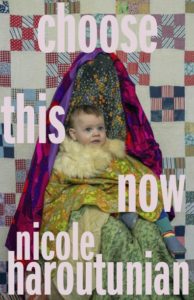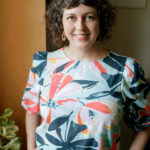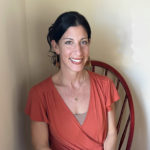 Interview by Sara Weiss
Interview by Sara Weiss
Choose This Now is a novel-in-stories following two friends across twenty years as they grow up, grow apart, and grow together. It is about art, labor, love, pregnancy, and parenthood—and the role of friendship in forging a life.
Upstairs, as Soraya gets into a stash of shoes, chewing on a well-used sneaker we really probably didn’t need secondhand, Val says, “You remember—the baby phase was really rough for me. I was so consumed by Berry that I felt like I didn’t even have myself for company. I couldn’t wait for her to go to school, to need me less. I feel like I’m just starting to enjoy being a mother.”
“With me, I feel like I’m constantly in mourning,” I say. I pour her a cup of Naveed’s stash of vibrant-red sour cherry tea, take a puckering sip of mine. “I am so in love with her at every stage, but I’ll never meet newborn Soraya again. I’ll never see her at six months again or experience that moment with her again when she finally figures out that the baby in the mirror is her. I just want another day with each of those people, you know? She keeps disappearing on me.”
“Are you crying?” she asks. “Honey.”
Can you tell us a little bit about the relationship between art and motherhood in the novel, and if this relationship in any way mirrors your own experience as a mother and artist?
I started Choose This Now when I was pregnant and sent in my last edits when my daughter was in kindergarten. Due to a mix of choice, dramatic daycare fails, and COVID, I was home with her for most of the first 4.5 years of her life, so I was immersed in baby- and toddlerhood. I write what I know, and what I knew while I was writing this book was pregnancy and early motherhood. For the character Taline, a lapsed painter and art educator, motherhood gives her both a structure and a lens for her artmaking. Having her baby reignited her own creative work. While I never stopped like she did (writing, that is–I did stop painting!), motherhood has made me more efficient and proactive in my writing life. It has also provided me with a broader community of collaborators, friends, and readers. That hasn’t happened yet for Taline at the end of the book, but I think it will.
Self-perception is an interesting theme throughout your book. The characters reflect on how they saw their lives playing out, and how becoming a mother either confirmed or altered their perceptions of themselves. How do you think you were able to convey this theme so effectively?
I’m so glad it was effective for you! I found myself writing very consciously about this theme. One way I went about it was noting these instances where characters are surprised by their own reflections. I hope it didn’t wind up being too overt, but at one point, a character is confronted by two versions of herself in someone else’s sunglasses. In another, a character watches herself disappear as a cop rolls down his car window. I also wrote two main characters, these best friends, who have very similar lives on paper, but their self-perception in motherhood is quite different. One is really affirmed by it, and sort of brought back to herself, while the other is totally destabilized.
The story “Shallow Latch” so authentically describes those early days with a newborn and the loss of autonomy a mother often feels. What inspired you to write this raw depiction of motherhood?
As a baby, my daughter was a terrible sleeper. For months, she would nap ONLY WHILE STRAPPED TO ME AND WALKING OUTDOORS. The first time she actually napped in her crib, for fifteen, then twenty minutes, I was like, wait, can I actually try writing something? At that point, I felt like the newborn days were enough behind me that I had a touch of perspective, but were still so viscerally with me that I could render how they felt. I had some urgency when I started it, too, because I didn’t know when she was going to wake up. So, I started writing “Shallow Latch” during that first real nap!
Do you think there’s a fundamental discrepancy between feminism and motherhood? The characters find that there are aspects of motherhood that are at odds with their feminist ideals or beliefs.
Here’s a quote from Val that stood out to me: “I’d spent so many years reading and analyzing texts that reject biological determinism, interrogate ideas of what is natural, and deconstruct our assumptions about traditional gender roles and reveal them to be cultural, societal, and rooted in the patriarchy, but at 4 a.m. the fact remains that I’m the one with the milk.”
I meant that both to be true and to be funny. I don’t think that feminism and motherhood are at odds. Val just didn’t have the right framework yet for understanding why having a newborn felt so bad. I wish I could have given her a stack of books—by Angela Garbes, Minna Dubin, Amanda Montei—before she needed them, so she’d have been more prepared. Of course, I could have given her that knowledge because I made her up! But I think a lot of people don’t consider issues like the lack of parental leave, postpartum care, and affordable childcare before they’re faced with them, and then they’re delirious with sleeplessness and are like, have I been wrong about everything?
In the passage we included at the top of the page, Val says she was too consumed by her daughter to enjoy being a mother. Taline, on the other hand, feels like she’s “constantly in mourning,” for the versions of her daughter that are lost. As a mother, I can relate to this feeling, the inability to grasp a moment before my kids grow out of it. Can you talk a little bit about this idea of motherhood and loss?
I remember the first time a friend told me that she couldn’t wait for her kids to get older. I was jealous of her for feeling that way. I was, and still am, unprepared for how much I miss the person my daughter used to be, even as I’m amazed and love equally the person that she is now. None of these characters are me or match my experience of motherhood exactly, but that passage sure does.
Choose This Now, Nicole Haroutunian
Noemi Press, March 2024,
243 pp., ISBN 978-1-955992-03-9
 Nicole Haroutunian is the author of Choose This Now (Noemi Press, 2024) and Speed Dreaming (Little a, 2015). Her work has appeared or is forthcoming in The Georgia Review, Story, Mutha Magazine, the Bennington Review, Joyland, Post Road, Tin House’s Open Bar, and elsewhere. She works in museum education, holds an MFA from Sarah Lawrence College, and lives with her family in Woodside, Queens in New York City.
Nicole Haroutunian is the author of Choose This Now (Noemi Press, 2024) and Speed Dreaming (Little a, 2015). Her work has appeared or is forthcoming in The Georgia Review, Story, Mutha Magazine, the Bennington Review, Joyland, Post Road, Tin House’s Open Bar, and elsewhere. She works in museum education, holds an MFA from Sarah Lawrence College, and lives with her family in Woodside, Queens in New York City.
 Sara Weiss holds an MFA from Sarah Lawrence College. Her writing has appeared in Literary Mama, Lilith, Mutha Magazine, Waterwheel Review, Bustle, Brain Child, Underwater New York and other places. She writes audio scripts for Good Night Stories for Rebel Girls and works as a college writing consultant. She lives in the Hudson Valley with her husband, two daughters, and their smallish dog.
Sara Weiss holds an MFA from Sarah Lawrence College. Her writing has appeared in Literary Mama, Lilith, Mutha Magazine, Waterwheel Review, Bustle, Brain Child, Underwater New York and other places. She writes audio scripts for Good Night Stories for Rebel Girls and works as a college writing consultant. She lives in the Hudson Valley with her husband, two daughters, and their smallish dog.
